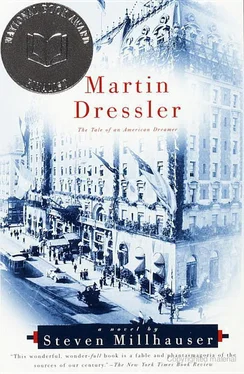But Dundee was only the most likable member of a large hotel staff. Martin visited the poorly ventilated staff dining room, spoke with the headwaiters, the steward, and the managing chef, listened to the complaints of the Irish chambermaids, visited the chief accountant and arranged to take lessons in the elements of bookkeeping. The details interested him, from the operation of the old steam elevators with their winding drums to the washing of the knives and forks, but they had no meaning until they were connected to the larger design. Then he grasped them, then he held them in place and felt a deep and almost physical satisfaction — and in his mind, in his chest, in the veins of his arms, he felt a secret exhilaration, as when in his childhood he had gone shopping with his mother and had realized not only that all the toy fire engines and diamond necklaces and leather gloves were different parts of one big department store, but that the store itself was part of a block of buildings, and all the blocks went repeating themselves, rectangle by rectangle, in every direction, until they formed a city.
As he threw himself into his new duties, which took him away from the life of the lobby but placed him close to the inner workings of the hotel, he sometimes had the sense that he was being led by friendly powers toward a destination they had marked out for him. The management, in the person first of Mr. Henning and then of Mr. Westerhoven, had shown him unusual favor, had singled him out and raised him up from the lowly rank of bellboy to his present position as personal secretary to the manager, all in the space of a few years. There had been rumors from time to time of Mr. Westerhoven’s retirement, of Mr. Henning’s promotion to manager, of the creation of a new position above assistant manager and below general manager, and Martin, who disliked rumors, which struck him as the exasperating equivalent of speculations about what would have happened if Lee had won the war, or if Booth had been a bad shot — Martin sometimes found himself wondering whether there might be something in the rumors after all, whether the friendly powers might be moving him in a direction. Then the dream-feeling would come over him, as if his real life were not here, where it seemed to be, but over there, a little off to one side, just over there.
Meanwhile the cigar stand was turning a nice little profit. Martin increased the amount of display space for cigarettes and added gift items that proved popular: alligator cigarette cases lined with satin, porcelain figurines of humorous pipe-smoking farmers, cast-iron clown faces that blew streams of little smoke rings. He and Bill Baer discussed ways of drawing women into this mostly male domain: on the cigarette counter they placed a chromo of a well-dressed woman smoking a cigarette, and alongside brightly lacquered boxes of specially selected cigars they set advertising cards directed at a woman in search of the perfect gift for the man in her life. Purchases by women had tripled over the last three months; and Martin added a new line of silver ashtrays, with the hotel insignia, a tiny Vanderlyn, engraved in black and red.
Martin had money now, more than ever before, even after his monthly rent for the cigar stand, his monthly contribution to his father’s store, his dinners with Bill Baer, and his visits to the house of rattling windows. In his free hours on the weekends he walked the streets of the city or rode the four Elevated lines, emerging at random from El stations to descend the graceful iron stairways with their peaked roofs, their slender columns ornamented at the top with lacy ironwork. He walked everywhere, alone or with Bill Baer — on sun-striped shadowy avenues under the El tracks, out on East River wharves, past fire escapes hung with blankets and joined by washlines, along new uptown row houses facing weedgrown bushy lots. As he walked, looking about, taking it all in, feeling a pleasant tension in his calves and thighs, he felt a surge of energy, a kind of serene restlessness, a desire to do something, to test himself, to become, in some way, larger than he was. He wasn’t sure what it was, this thing he wanted to be, but one day not long after his twentieth birthday he had a little idea that began to occupy his deepest attention.
HE HAD LEARNED FROM HIS FATHER THAT THE old Paradise Musée was going to shut down. It stood at the other end of the block, on the other side of the street, where he never walked as a child except when his mother took him to see the exhibits. Moved by memory and curiosity, Martin paid a visit during his lunch hour to the gloomy old building with its dark rooms full of melancholy wax figures and its third-floor hall of dungeons and prisons. The museum was deserted except for a single heavyset man in a silk hat who walked slowly about with his hands behind his back. On the shadowy second-floor landing, beneath an arched window thick with dust, Martin passed a guard in a dark green uniform who stood leaning an elbow on the window embrasure. The guard stared at him with an expression of hostility and rudely ignored Martin’s question. Martin, feeling a burst of anger in his neck, began to ask the question again sharply, before he saw that the guard was made of wax. A small spiderweb hung over his mustache. The real guard sat dozing in a chair on the second floor not far from a hooded executioner holding an ax. Downstairs the elderly ticket seller knew only that the lease was up in a few months and that the museum’s proprietor, Mr. Toft, was not planning to renew. He had already sold the whole lot of wax figures to an establishment in Coney Island off Surf Avenue. No one knew the landlord’s plans, but Martin could ask for himself: Mr. Toft was somewhere in the museum at that very moment, a big man in a silk hat.
Mr. Toft seemed sunk in some private grief and turned to Martin a pair of gloomy dark eyes over folds of tired flesh like melted candlewax. He changed immediately when he learned who Martin was — he remembered buying cigars from him when Martin was a mere slip of a boy. And how was Otto? And his fine mother? In a small restaurant off Third Avenue he listened to Martin’s proposal, burst into a sudden sharp laugh, then narrowed his eyes and agreed to lease the building to Martin if Martin could come up with a rent check before the end of the month. He named a large sum that Martin at first thought was a joke. Mr. Toft wiped his mustache with a napkin, removed his watch from his vest pocket and slipped it back in, and asked to be remembered to Martin’s father and mother.
Martin watched Mr. Toft’s broad back retreating down the street and tried to recall him from the old days, but saw only the present Mr. Toft with his melancholy eyes, bushy mustache, and candlewax eye-pouches. He gave up the idea of the lease as a stupid mistake, then changed his mind and paid a visit to his bank, where he was well known. In a small neat room with a big dark desk that reminded Martin of a great slab of chocolate, the banker explained that under the circumstances a loan would have to be guaranteed by a co-signer.
“But I can guarantee it myself,” said Martin. “Down to the last nickel.”
“Not in the way we mean,” replied the banker patiently, with a slight smile.
Martin, who was determined to act without his father’s help, angrily abandoned his crackpot scheme. So that was how it was! Despite his success at the Vanderlyn, in the eyes of the world he was nothing at all. It occurred to him that the world was of course right. All very well and good to be the private secretary to the manager of the Vanderlyn Hotel, and to put a little vim into a dead cigar stand, but measured against his own confused desires, these were the accomplishments of a boy. Mr. Toft’s sharp laugh came back to him, and the patient dry tone of the banker, and he wondered what kind of young dummkopf they supposed he was. In his boyhood bed over the cigar store he slept badly for two nights, and at noon the next day he had lunch with Walter Dundee.
Читать дальше












